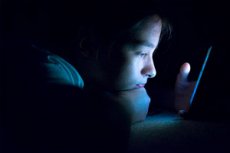Nye publikasjoner
Studie viser at populære tenåringer sover mindre enn sine jevnaldrende
Sist anmeldt: 02.07.2025

Alt iLive-innhold blir gjennomgått med medisin eller faktisk kontrollert for å sikre så mye faktuell nøyaktighet som mulig.
Vi har strenge retningslinjer for innkjøp og kun kobling til anerkjente medieområder, akademiske forskningsinstitusjoner og, når det er mulig, medisinsk peer-evaluerte studier. Merk at tallene i parenteser ([1], [2], etc.) er klikkbare koblinger til disse studiene.
Hvis du føler at noe av innholdet vårt er unøyaktig, utdatert eller ellers tvilsomt, velg det og trykk Ctrl + Enter.

På grunn av den sene melatoninproduksjonen og økt årvåkenhet om kvelden, har tenåringer ofte problemer med å sovne på et tidspunkt som tillater dem å få de anbefalte åtte til ti timene med søvn hver natt.
Det er i ungdomsårene at økende skolekrav, aktiviteter, større uavhengighet fra foreldre og forhold til jevnaldrende begynner å konkurrere med søvn. Imidlertid blir rollen til sosial kontekst ofte oversett når man studerer ungdomssøvn. Nå har forskere fra Sverige og Australia undersøkt hvordan popularitet blant jevnaldrende påvirker søvnvanene til 14- til 18-åringer.
Studien er publisert i tidsskriftet Frontiers in Sleep.
«Vi viste at populære tenåringer rapporterer kortere søvnvarighet. Spesielt populære jenter, men ikke gutter, rapporterer flere symptomer på søvnløshet», sa dr. Serena Badukko, søvnforsker ved Örebro universitet og førsteforfatter av artikkelen. «Mest interessant er det at popularitet ser ut til å ha en negativ innvirkning på søvn både før og etter introduksjonen av smarttelefoner.»
Populære og undersovne I et utvalg av mer enn 1300 svenske tenåringer, nesten halvparten av dem jenter, undersøkte forskerne om popularitet korrelerte med kortere søvnvarighet. De ba tenåringene om å nominere opptil tre venner, og de som fikk flest nominasjoner ble ansett som mer populære. Disse tenåringene sov mindre enn sine jevnaldrende, og de mest populære sov opptil 27 minutter mindre.
Da forskerne så på gutter og jenter separat, fant de også en sammenheng mellom popularitet og søvnløshetssymptomer: Mer populære jenter opplevde flere søvnløshetssymptomer, som problemer med å sovne eller sovne, eller å våkne for tidlig. Populære gutter opplevde ikke disse symptomene i samme grad.
Disse kjønnsforskjellene er ennå ikke fullt ut forstått, men det faktum at gutter og jenter viser ulik vennskapsatferd kan gi en forklaring. «Jenter uttrykker mer bekymring og oppmerksomhet overfor vennene sine og viser mer hjelpende atferd enn gutter. Dette kan bety at de bærer med seg disse bekymringene når det er på tide å legge seg», forklarte Badukko.
Telefoner forklarer kanskje ikke sammenhengen mellom popularitet og søvn. «Vi ser også at popularitet var assosiert med dårligere søvn både før og etter fremveksten av bærbar kommunikasjonsteknologi», sa Badukko. Dette tyder på at det kanskje ikke er smarttelefoner som forårsaker at populære tenåringer sover mindre; i stedet kan andre mekanismer være i spill.
Forskerne antyder at det å ha flere venner kan bety mer tid brukt sammen med dem, noe som kan føre til mindre tid igjen til søvn. Mer emosjonell investering kan også føre til søvnvansker. Begge forklaringene gjelder tiden før og etter at smarttelefoner ble vanlige. Dette krever imidlertid detaljert forskning, sier forskerne.
Opphopning av søvngjeld «Tenåringer er kanskje den befolkningsgruppen som lider av mest søvnmangel i løpet av livet», sa Badukko. «Tidligere forskning tyder på at 30 minutter med ekstra søvn kan føre til forbedret mental helse og bedre prestasjoner på skolen.»
Med tidlig skolestart prøver mange tenåringer å ta igjen tapt søvn i helgene – en strategi som kan slå tilbake. «La oss si at en tenåring sover lenge til klokken 13 på søndag. Det vil være vanskelig å få sove den natten for å være klar for skolen dagen etter, fordi de ikke vil føle seg trøtte», sa Badukko. «Å utsette oppvåkningstiden for mye kan forverre problemet med søvngjeld som har akkumulert seg i løpet av uken.»
Forskerne mener at det å diskutere sosiale normer om søvn og jevnaldrendes forventninger til leggetid er en manglende del av eksisterende tiltak for å forbedre søvn hos ungdom. I tillegg er det behov for ytterligere forskning for å undersøke forholdet mellom sosial tilknytning og søvn, og for å avklare kjønnsforskjellene som er funnet.
